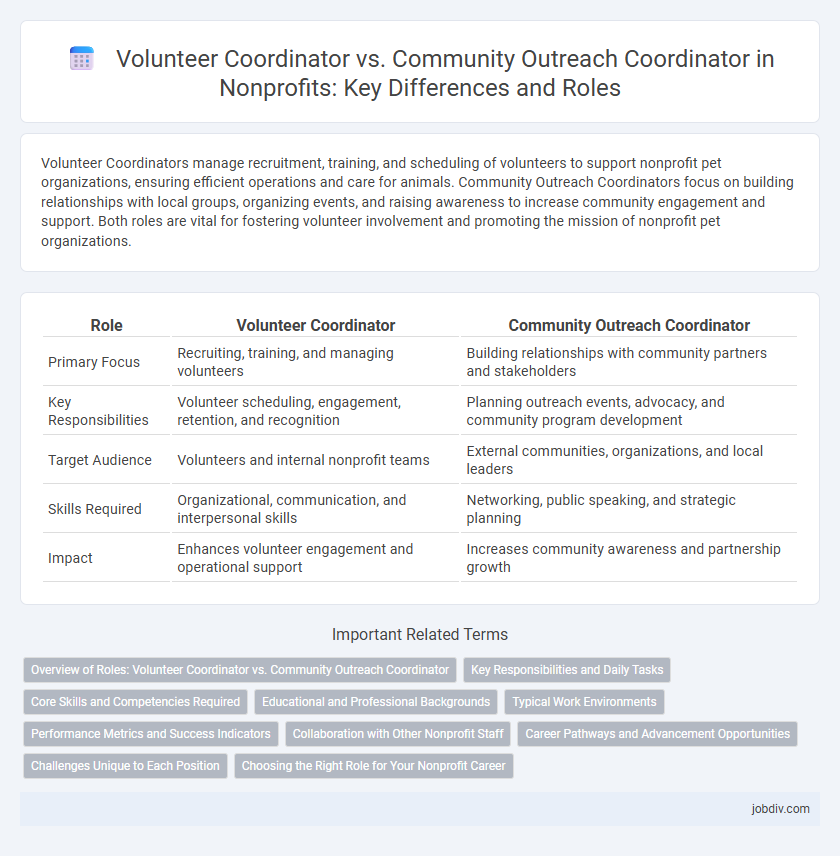Volunteer Coordinators manage recruitment, training, and scheduling of volunteers to support nonprofit pet organizations, ensuring efficient operations and care for animals. Community Outreach Coordinators focus on building relationships with local groups, organizing events, and raising awareness to increase community engagement and support. Both roles are vital for fostering volunteer involvement and promoting the mission of nonprofit pet organizations.
Table of Comparison
| Role | Volunteer Coordinator | Community Outreach Coordinator |
|---|---|---|
| Primary Focus | Recruiting, training, and managing volunteers | Building relationships with community partners and stakeholders |
| Key Responsibilities | Volunteer scheduling, engagement, retention, and recognition | Planning outreach events, advocacy, and community program development |
| Target Audience | Volunteers and internal nonprofit teams | External communities, organizations, and local leaders |
| Skills Required | Organizational, communication, and interpersonal skills | Networking, public speaking, and strategic planning |
| Impact | Enhances volunteer engagement and operational support | Increases community awareness and partnership growth |
Overview of Roles: Volunteer Coordinator vs. Community Outreach Coordinator
A Volunteer Coordinator manages recruitment, training, and scheduling of volunteers to support nonprofit programs, ensuring volunteer engagement aligns with organizational goals. A Community Outreach Coordinator develops and maintains relationships with community partners, plans advocacy efforts, and promotes the nonprofit's mission to increase public awareness and participation. Both roles are essential for capacity building, with the Volunteer Coordinator focused internally on volunteer management and the Outreach Coordinator driving external community engagement.
Key Responsibilities and Daily Tasks
Volunteer Coordinators manage recruitment, training, and scheduling of volunteers to support nonprofit programs, ensuring efficient volunteer engagement and retention. Community Outreach Coordinators build partnerships, develop outreach strategies, and organize events to raise awareness and foster community involvement. Both roles require strong communication skills, but Volunteer Coordinators focus more on internal volunteer management, while Outreach Coordinators emphasize external relationship building and program promotion.
Core Skills and Competencies Required
Volunteer Coordinators excel in organizational skills, volunteer recruitment, and scheduling, requiring strong interpersonal communication and leadership abilities to manage diverse volunteer teams effectively. Community Outreach Coordinators demonstrate expertise in public relations, event planning, and stakeholder engagement, with competencies in strategic communication and cultural sensitivity to build lasting community partnerships. Both roles demand adaptability, problem-solving skills, and proficiency in data management tools to track program impact and ensure mission alignment.
Educational and Professional Backgrounds
Volunteer Coordinators typically possess backgrounds in nonprofit management, social work, or human resources, often holding bachelor's degrees in related fields to effectively recruit, train, and manage volunteer staff. Community Outreach Coordinators usually have educational credentials in public relations, communications, or community development, emphasizing skills in stakeholder engagement and strategic partnership building. Professional certifications such as Certified Volunteer Administrator (CVA) benefit Volunteer Coordinators, while Outreach Coordinators may pursue credentials in marketing or community planning to enhance program impact.
Typical Work Environments
Volunteer Coordinators primarily work within nonprofit organizations, managing volunteers in settings such as shelters, hospitals, and community centers, where direct interaction with volunteers is essential. Community Outreach Coordinators operate in diverse environments including schools, municipal agencies, and public events, focusing on building relationships and promoting programs to the broader community. Both roles often require flexibility to work in office spaces combined with on-site locations where community engagement takes place.
Performance Metrics and Success Indicators
Volunteer Coordinators are evaluated through metrics such as volunteer retention rates, event participation levels, and hours contributed, reflecting their effectiveness in managing and motivating volunteers. Community Outreach Coordinators measure success by tracking the number of partnerships established, community event attendance, and the growth in community awareness or engagement. Both roles rely on quantitative data and qualitative feedback to optimize nonprofit impact and resource allocation.
Collaboration with Other Nonprofit Staff
Volunteer Coordinators collaborate closely with nonprofit staff to manage volunteer recruitment, training, and scheduling, ensuring seamless integration of volunteers into program activities. Community Outreach Coordinators work alongside internal teams to develop partnerships and engage community members, amplifying the organization's mission and extending its reach. Both roles require effective communication and strategic coordination to align volunteer efforts and outreach initiatives with the nonprofit's goals.
Career Pathways and Advancement Opportunities
Volunteer Coordinators primarily manage volunteer recruitment, training, and retention, developing skills highly valued in nonprofit management and event planning careers. Community Outreach Coordinators engage with diverse stakeholders to build partnerships and increase program visibility, cultivating expertise in public relations and community development. Both roles offer advancement opportunities into senior management positions such as Volunteer Program Director or Community Engagement Manager, with potential growth into executive leadership depending on organizational size and sector specialization.
Challenges Unique to Each Position
Volunteer Coordinators face challenges in recruiting, training, and retaining a diverse volunteer base while managing scheduling conflicts and ensuring consistent engagement. Community Outreach Coordinators encounter difficulties in building and maintaining strategic partnerships, navigating cultural differences, and effectively communicating organizational missions to varied community groups. Both roles require adaptive problem-solving skills but focus on distinct aspects of nonprofit engagement and resource mobilization.
Choosing the Right Role for Your Nonprofit Career
Volunteer Coordinators manage recruitment, training, and retention of volunteers to support nonprofit programs, ensuring a reliable workforce for various initiatives. Community Outreach Coordinators focus on building relationships with local organizations, fostering partnerships, and increasing public awareness to expand the nonprofit's impact. Choosing the right role depends on whether you prefer hands-on volunteer management or strategic community engagement and partnerships to advance the nonprofit's mission.
Volunteer Coordinator vs Community Outreach Coordinator Infographic

 jobdiv.com
jobdiv.com